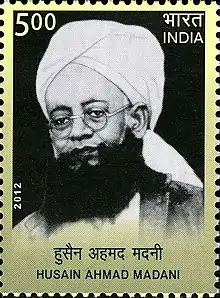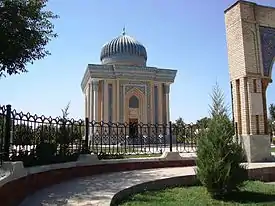Hussain Ahmed Madani
Hussain Ahmad Madani (6 October 1879 – 5 December 1957) was an Indian Islamic scholar, serving as the principal of Darul Uloom Deoband. He was among the first recipients of the civilian honour of Padma Bhushan in 1954.[2][3]
Sayyid Hussain Ahmad Madani | |
|---|---|
 | |
| Mawlana | |
| 5th Principal of Darul Uloom Deoband | |
| In office 1927 – 5 December 1957 | |
| Preceded by | Anwar Shah Kashmiri |
| Succeeded by |
|
| Personal details | |
| Born | 6 October 1879 |
| Died | 5 December 1957 (aged 78) |
| Children | Asad Madni, Arshad Madani, Asjad Madani |
| Alma mater | Darul Uloom Deoband |
| Personal | |
| Religion | Islam |
| Jurisprudence | Hanafi |
| Creed | Maturidi[1] |
| Movement | Deobandi — Chisti-Sabiri branch of the Chisti order |
| Main interest(s) | Hadith, Tafsir, Fiqh |
| Notable idea(s) | Composite nationalism |
| Muslim leader | |
Influenced by
| |
Madani played a key role in cementing the Congress-Khilafat Pact in the 1920s and "Through a series of lectures and pamphlets during the 1920s and 1930s, Madani prepared the ground for the cooperation of the Indian Ulama with the Indian National Congress."[4]
His work Muttahida Qaumiyat Aur Islam was published in 1938 and advocated for a united country, in opposition to the partition of India.[5]
Early life and ancestry
Hussain Ahmed Madani was born in Uttar Pradesh in a small town named Bangarmau in district Unnao. When he was born his father worked as a teacher in Bangarmau. His family was originally from Tanda in district Faizabad. His father's name was Sayyid Habibullah, who was a descendant of the Islamic prophet Muhammad through Husayn ibn Ali down 35 generations.[6] Husayn's 16th generation down descendant Sayyid Nurul Haq was given 24 villages in Tanda by the Emperor of Delhi. Eventually through time, some of this land was inherited by Sayyid Habibullah (thirteen villages as of 1757).[7]
Education and spiritual training
In 1892, at the age of thirteen, he went to the Darul Uloom Deoband, where he studied under Mehmud Hasan. After completing the esoteric sciences, he became a disciple of Rasheed Ahmad Gangohi, who later authorised him to initiate others in the Sufi path. Rasheed Ahmad Gangohi was also the pir (or spiritual teacher) of Mehmud Hasan and it was Mehmud Hasan who told Hussain Ahmed to become Rasheed Ahmad Gangohi's disciple too. He was held among the senior khulafa (or successors) of Rasheed Ahmed Gangohi.
Through him his spiritual lineage goes back to Alauddin Sabir Kaliyari who was the originator of the Chisti-Sabiri branch of the Chisti order. This spiritual chain is however strongly linked with the Naqshbandi order of Sufism as well, because one of the ancestral pirs of Hussain Ahmed had also accepted Syed Ahmad Shaheed as his master who belonged to the Naqshbandi order. Thus Hussain Ahmed had the benefit of being linked to both the Naqshbandi and the Chisti order. While the former Sufi order stressed silent invocation, the latter focused on the more esoteric aspects of Islam. His main school of thought, of whose litanies he practiced, was however Chisti-Sabiri order.
Career
After graduating from the Darul Uloom Deoband, he migrated to Medina with his family. He began teaching Arabic grammar, usul al-fiqh, usul al-hadith, and Quranic exegesis. He spent 18 years teaching these various Islamic sciences in Medina. He was then appointed as head teacher and "Shaikhul Hadith" of Darul Uloom Deoband. He served in this position for approximately 28 years.[3]
Efforts for independence
After his teacher Mehmud Hasan was sentenced by the British for his role in the Silk Letter Conspiracy to a prison in the Island of Malta, Madani volunteered to go with him so that he could look after him. He had personally not been convicted. Mehmud was imprisoned for three years. It so happened that Islamic month of Ramadan had come and neither Mehmud Hasan nor Madani was Hafiz of the Qur'an. At this instance, Mehmud Hasan said to his student (Madani) that most of his life, he didn't have a Ramadan without listening to the complete Qur'an in the special night prayers called Tarawih. Hussain Ahmed Madani, who respected his teachers very much, took this very sentence of his teacher seriously and started to memorize the Quran while in prison. Daily, Madani would memorise one Juz (part) of the Quran and recite it in the Tarawih. Continuing to do so, he memorized the whole Quran in the 30 days of Ramadan, thus saving his teacher Mehmud Hasan from being deprived of listening to the Quran, as he had every Ramadan.
After his release, he returned to India and became actively involved in India's freedom struggle. He had considerable influence over a section of the Muslims, more prominently those belonging to Eastern Uttar Pradesh and Bihar. Maulana Madani was one of the founder members of Jamia Millia Islamia, New Delhi. He was the member of foundation committee (for the foundation of Jamia Millia Islamia) headed by Sheikhul-Hind Maulana Mahmood Hasan, met on 29 October 1929. He was against the two-nation theory,[8] and predominantly due to this, a large number of Muslims from Eastern U.P. and Bihar declined to migrate to Pakistan at the time of 1947 independence of Pakistan and the Partition of India. He became the President of the Jamiat Ulema-e-Hind, a post he held until his death in 1957. (He also held the post of Shaikhul Hadith at Darul Uloom Deoband till his death).[3]
Debate between Iqbal and Madani
Husain Ahmad Madani was against the inception of Pakistan.[9] He was of the view that in the present times, nations are formed on the basis of homeland (geographic basis) and not on ethnicity and religion.[10] On the issue of whether the identity of a nation depended upon its land or religion, there was an interesting debate between Husain Ahmad Madani and Allama Iqbal. Allama Iqbal, a known pan-Islamist and a leading pro-Pakistan figure of the time, had at first developed differences of opinion with Husain Ahmad Madani over this issue. Later a mutual friend of both these leaders, a person named Taloot intervened by writing letters to both Iqbal and Madani. Taloot was able to bring more clarity to the circumstances and the intent of Madani in stating what he originally had stated about forming new nations and homelands. Taloot's intervention was successful and eventually both Iqbal and Madani were able to understand each other better. It resulted in a reconciliation between the two Muslim leaders and Iqbal finally wrote a personal letter saying that he respected Maulana Husain Ahmad Madani's service and devotion to Islam as much as any other Muslim despite their political differences.[11] Husain Ahmad Madani himself was reportedly quoted as saying, "All should endeavor jointly for such a democratic government in which Hindus, Muslims, Sikhs, Christians and Parsis are included. Such a freedom is in accordance with Islam." ... ."that Muslims could live as observant Muslims in a religiously plural society where they would be full citizens of an independent, secular India."[3]
To quote a newspaper article in The Nation (newspaper) here, "Whenever the history of Indian independence is discussed, the name of the brave Deoband scholars is taken with great reverence and honour."[3]
Literary works
- Composite Nationalism and Islam
- Naqsh-e-Hayat (Autobiography of Maulana Madni).[12]
- Ash-Shihabus Saqib (A refutation of Ahmed Raza Khan Barelvi) [13]
- Maktubat Shaykh al-Islam (Spread over 2000 pages).[14]
- Safar Nama Shaykhul Hind Mahmud al-Hasan (related to Silk Letter Movement).[14]
- Tasawwur-e-Shaikh (related to Tasawwuf)[14]
Awards and recognition

- Padma Bhushan Award by the Government of India in 1954[2]
- India Post issued a commemorative postage stamp in his honour in 2012[15]
- Madani Square, structure named after his efforts and hard work in Sylhet, Bangladesh.
Death and legacy
Madni died on 5 December 1957. His funeral prayer was led by Muhammad Zakariyya Kandhlawi.[16] Urdu author Nizamuddin Asir Adrawi has written his biography, Ma'asr Shaykh al-Islam which is published by Darul Mu'allifeen, Deoband.

Photo Gallery
 Hussain Ahmad Madani
Hussain Ahmad Madani Husain Ahmad Madani 2012 stamp of India
Husain Ahmad Madani 2012 stamp of India Passport of Madani
Passport of Madani Madani Chattar, Nayasarak, Sylhet
Madani Chattar, Nayasarak, Sylhet Madani and Prime Minister
Madani and Prime Minister Grave of Madani
Grave of Madani Madani with Prashad
Madani with Prashad Hussain Ahmad Madani
Hussain Ahmad Madani Hussain Ahmad Madani
Hussain Ahmad Madani Hussain Ahmad Madani
Hussain Ahmad Madani
See also
References
- "A Short Biography of Husain Ahmad Madani". elwahabiya.com.
- "Padma Awards" (PDF). Ministry of Home Affairs, Government of India. 2015. Archived (PDF) from the original on 15 November 2014. Retrieved 19 July 2017.
- The rise and fall of the Deoband movement, The Nation (newspaper), Published 27 June 2015, Retrieved 19 July 2017
- Sikka, Sonia; Puri, Bindu; Beaman, Lori G. (2015). Living with Religious Diversity. Routledge. ISBN 9781317370994.
- Peers, Douglas M.; Gooptu, Nandini (2017). India and the British Empire. Oxford University Press. ISBN 9780192513526.
Madani, head for several decades of the Deoband training centre for theologians, strongly supported Congress nationalism and the ideal of a 'composite nationalism' within an united India, which he thought would be more conducive to the spread and prosperity of his community over the entire subcontinent than any religious partition.
- Metcalf, Husain Ahmad Madani 2012.
- Muhammad Ruhul Amin Nagori, "ফেদায়ে মিল্লাত সায়্যিদ আসআদ মাদানী (র:)", জীবনী (in Bengali), As Siraz
- How Indians see Jinnah. BBC News. Retrieved on 19 July 2017
- Ulema and the Pakistan Movement. Retrieved on 19 July 2017.
- Zamzam 17 July 1938 cited by Pakistan Struggle and Pervez, Tulu-e-Islam Trust, Lahore, p. 614
- Madani and Iqbal letters in Urdu language from 1938 on the issue of forming new homelands, Retrieved 19 July 2017
- https://archive.org/details/NaqshEHayatByShaykhHusainAhmadMadnir.a
- https://archive.org/details/Ash-shihab-us-saqibByShaykhHusainAhmadMadnir.a
- Ma'asr Shaykh al-Islam (Biography of Hussain Ahmed Madani), Mawlāna Nizāmuddīn Asīr Adrawī, Page 494, Darul Mu'allifeen Deoband (5th edition, April 2017).
- India Post issued a commemorative postage stamp in Husain Ahmad Madani's honour in 2012, The Nation (newspaper) article shows the stamp image, Published 27 June 2015, Retrieved 19 July 2017
- Abu Muhammad Maulana Sana’ullah Sad Shuja’abadi. Ulama-e-Deoband Ke Aakhri Lamhaat (in Urdu). Saharanpur: Maktaba Rasheediya. p. 95.
Bibliography
- Metcalf, Barbara (2012), Husain Ahmad Madani: The Jihad for Islam and India's Freedom, Oneworld Publications, ISBN 978-1-78074-210-6
- Moj, Muhammad (2015), The Deoband Madrassah Movement: Countercultural Trends and Tendencies, Anthem Press, ISBN 978-1-78308-389-3
External links
- Al-E’tidaal Fi Maraatib ar-Rijaal (English Translation), Islamic Book Service, Pages 34–35
- Aap Beeti (English Translation), Darul Isha’at, Pages 375–376
